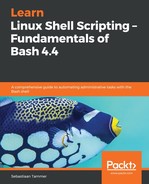Basic globbing is done mainly with the wildcard, sometimes combined with part of a filename. However, just as regular expressions allow us to substitute a single character, so do globs.
Regular expressions achieve this with the dot; in globbing patterns, the question mark is used:
reader@ubuntu:~/scripts/chapter_09$ ls -l if-then-*
-rw-rw-r-- 1 reader reader 448 Sep 30 20:10 if-then-else-proper.sh
-rw-rw-r-- 1 reader reader 422 Sep 30 19:56 if-then-else.sh
-rw-rw-r-- 1 reader reader 535 Sep 30 19:44 if-then-exit-rc-improved.sh
-rw-rw-r-- 1 reader reader 556 Sep 30 19:18 if-then-exit-rc.sh
-rw-rw-r-- 1 reader reader 416 Sep 30 18:51 if-then-exit.sh
reader@ubuntu:~/scripts/chapter_09$ ls -l if-then-e???.sh
-rw-rw-r-- 1 reader reader 422 Sep 30 19:56 if-then-else.sh
-rw-rw-r-- 1 reader reader 416 Sep 30 18:51 if-then-exit.sh
The globbing pattern if-then-e???.sh should speak for itself now. Where the ? is present, any character (letter, digit, special character) is a valid substitute.
In the preceding example, all three question marks are replaced by letters. As you might have deduced, the regular expression . character serves the same function as the globbing pattern ? character: it is valid for exactly one character.
Finally, the single bracket notation we use for regular expressions can also be used in globbing. A quick example shows how we can use this with cat:
reader@ubuntu:/tmp$ echo ping > ping # Write the word ping to the file ping.
reader@ubuntu:/tmp$ echo pong > pong # Write the word pong to the file pong.
reader@ubuntu:/tmp$ ls -l
total 16
-rw-rw-r-- 1 reader reader 5 Oct 14 17:17 ping
-rw-rw-r-- 1 reader reader 5 Oct 14 17:17 pong
reader@ubuntu:/tmp$ cat p[io]ng
ping
pong
reader@ubuntu:/tmp$ cat p[a-z]ng
ping
pong
